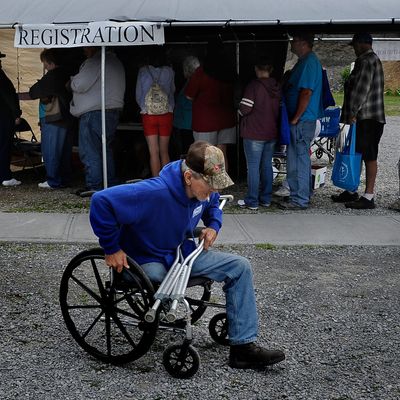
Here are some grim statistics for a grim time: Roughly 18 million people are set to lose their health insurance within the first year after the Affordable Care Act is repealed, the Congressional Budget Office reported last week. Over the next decade, that number could climb as high as 32 million.
But as Vanderbilt University sociologist Tara McKay recently wrote in the Conversation, these numbers, alarming enough on their own, also open the door for a broader societal problem: When enough people in a given area are uninsured, she explained, it eats away at the social fabric of the neighborhood, creating a place where people are more suspicious, less engaged, and less connected to those around them.
In a study published earlier this month in the Journal of Health and Social Behavior, McKay and her co-author Stefan Timmermans, a sociologist at UCLA, examined data from the Los Angeles Family and Neighborhood Survey, which tracked the evolution of L.A. neighborhoods and the health of their residents between 2000 and 2008. The pair found a significant link between health coverage and community engagement: When more people in a given neighborhood had health insurance, levels of connection and trust between neighbors were higher, too (even after the researchers took into account other factors that could influence how people feel about where they live). As McKay explained:
We specifically measured the consequences of living in a community with high levels of uninsurance on residents’ reports of social cohesion, or their feelings of trust, mutual obligation and reciprocity toward their neighbors. Moving from a community where almost everyone has health insurance to one where more than half are uninsured results in a 34 percent decrease in residents’ perceptions of social cohesion in their community, we found.
The study authors offered a couple explanations for why that might be the case: For one thing, past research has shown that when people are stuck paying for their health care out of pocket, it can deepen inequality; inequality, in turn, stokes mistrust. For another, McKay wrote, too many uninsured people places extra strain on a community’s institutions:
[I]n battles over state and local budgets, attempts to cover the uninsured through the redistribution of new or existing funds may run into political barriers or be forced to compete with other public services such as education and law enforcement. These battles can create competing interests and goals within a community that contribute to the breakdown of social cohesiveness, trust and reciprocity among community members over time.
“It is not yet clear how a repeal of ACA will affect communities,” she concluded, but “a repeal may undo any gains that communities have experienced over the past few years in terms of increased trust and reciprocity” — meaning that even those who keep their health insurance may indirectly feel the effects of their neighbors’ loss.




